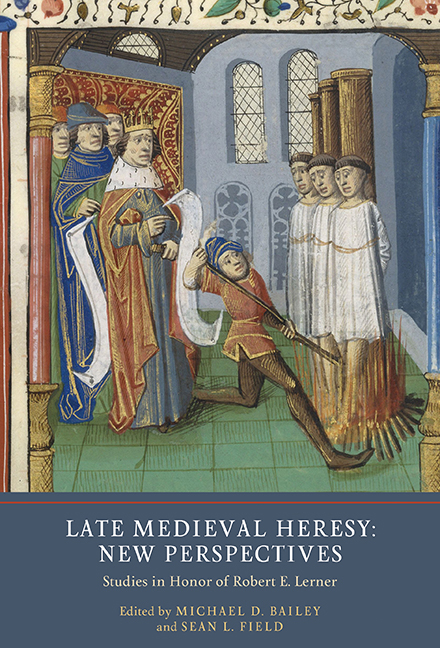Book contents
- Frontmatter
- Contents
- Preface: Robert E. Lerner: A Portrait
- List of Contributors
- Introduction: Historiography, Methodology, and Manuscripts: Robert E. Lerner and the Study of Late Medieval Heresy
- 1 The Heresy of the Templars and the Dream of a French Inquisition
- 2 The Dissemination of Barthélemy Sicard's Postilla super Danielem
- 3 Magic, Mysticism, and Heresy in the Early Fourteenth Century
- 4 The Making of a Heretic: Pope John XXII's Campaign against Louis of Bavaria
- 5 Unusual Choices: The Unique Heresy of Limoux Negre
- 6 Princely Poverty: Louis of Durazzo, Dynastic Politics, and Heresy in Fourteenth-Century Naples
- 7 Disentangling Heretics, Jews, and Muslims: Imagining Infidels in Late Medieval Pastoral Manuals
- 8 New Frontiers in the Late Medieval Reception of a Heretical Text: The Implications of Two New Latin Copies of Marguerite Porete's Mirror of Simple Souls
- 9 Disputing Prophetic Thought: The 1466 Questio quodlibetalis of Johannes of Dorsten
- 10 Heretics, Allies, Exemplary Christians: Latin Views of Ethiopian Orthodox in the Late Middle Ages
- 11 ‘By them in reality I meant the Jews’: Medieval Heretics in the Work and Life of Renate Riemeck (1920–2003)
- Afterword: Who or What Was a Heretic in the Late Middle Ages?
- Robert E. Lerner: A Chronological Bibliography
- Index
- York Medieval Press: Publications
1 - The Heresy of the Templars and the Dream of a French Inquisition
Published online by Cambridge University Press: 14 June 2019
- Frontmatter
- Contents
- Preface: Robert E. Lerner: A Portrait
- List of Contributors
- Introduction: Historiography, Methodology, and Manuscripts: Robert E. Lerner and the Study of Late Medieval Heresy
- 1 The Heresy of the Templars and the Dream of a French Inquisition
- 2 The Dissemination of Barthélemy Sicard's Postilla super Danielem
- 3 Magic, Mysticism, and Heresy in the Early Fourteenth Century
- 4 The Making of a Heretic: Pope John XXII's Campaign against Louis of Bavaria
- 5 Unusual Choices: The Unique Heresy of Limoux Negre
- 6 Princely Poverty: Louis of Durazzo, Dynastic Politics, and Heresy in Fourteenth-Century Naples
- 7 Disentangling Heretics, Jews, and Muslims: Imagining Infidels in Late Medieval Pastoral Manuals
- 8 New Frontiers in the Late Medieval Reception of a Heretical Text: The Implications of Two New Latin Copies of Marguerite Porete's Mirror of Simple Souls
- 9 Disputing Prophetic Thought: The 1466 Questio quodlibetalis of Johannes of Dorsten
- 10 Heretics, Allies, Exemplary Christians: Latin Views of Ethiopian Orthodox in the Late Middle Ages
- 11 ‘By them in reality I meant the Jews’: Medieval Heretics in the Work and Life of Renate Riemeck (1920–2003)
- Afterword: Who or What Was a Heretic in the Late Middle Ages?
- Robert E. Lerner: A Chronological Bibliography
- Index
- York Medieval Press: Publications
Summary
When Philip IV ordered the arrest of all Templars in France, he and his advisors set in motion a heresy inquisition of unprecedented ambition. Secret arrest orders accompanied by a set of vernacular instructions were sent to the king's secular agents across the kingdom on 14 September 1307. The inquisitor William of Paris followed with his own letter on 22 September, addressed to the Dominican inquisitors of Toulouse and Carcassonne, and to Dominican priors, subpriors, and lectors throughout the kingdom, asking them to stand ready to receive confessions. Arrests duly took place on 13 October. The plan was evidently to secure an overwhelming number of confessions as rapidly as possible and force Pope Clement V to condemn the Order of the Temple. The pope, however, first expressed his displeasure in a letter of 27 October, and on 22 November ordered that Templars across the rest of Europe be taken into custody for ecclesiastical trial. Clement then brought Philip IV and William of Paris up short in late January or early February 1308 by suspending the power of French inquisitors to act in this affair. When the pope finally agreed to restart the inquiries in July 1308, it was on his own terms, with such inquiries being entrusted to bishops working in concert with wider groups of churchmen.
Because the ‘Trial of the Templars’ in France has most often been studied as a conflict between Church and state rather than as an episode in the history of heresy and inquisition, it has gone largely unremarked that the events of fall 1307 amounted to an audacious effort to create a proto-national heresy inquisition in France. As Julien Théry has argued, the attack on the Templars must be understood within the decade-long drive to build a ‘royal theocracy’ with Philip IV as ‘pope in his kingdom’. But within this process of ‘pontificalizing’ the French monarchy, only in 1307 did the king and his men attempt to seize control of a crucial aspect of papal authority – the power to deploy heresy inquisition. Beginning in 1301, the attacks on Bishop Bernard Saisset, Pope Boniface VIII, the Templars, and Bishop Guichard of Troyes often used the language of heretical danger to represent the king as the defender of Christ against His enemies. But only the proceedings against the Templars invoked the authority of an inquisitor of heretical depravity.
- Type
- Chapter
- Information
- Late Medieval Heresy: New PerspectivesStudies in Honor of Robert E. Lerner, pp. 14 - 34Publisher: Boydell & BrewerPrint publication year: 2018



